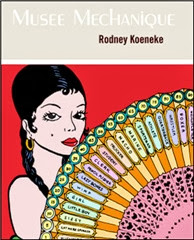Grabbed a brief wedge of sun this weekend to work through a stack of TRY!s, David Brazil & Sara Larsen’s freewheeling collage of the now. Apropos of community, the March 29th issue has a witty call-and-response between Alli Warren and Suzanne Stein about where to go drink after 21 Grand readings in Oakland. There’s been a seismic shift from Luka’s to Mwa—“The Great Migration, (c. 2009)”—and they’re trying to make sense of the aftershocks. In the process, both manage to talk about the anxieties and limits of poetic communities while avoiding words like “poetic community,” the $3 fish taco of contemporary literary discourse.
Alli’s piece makes light of “the richness of the phenomena of the after-party universe” by dispassionately toting up the pros and cons of each space—décor, menu, bar service, yelp reviews. (The fried chicken, yelp says blithely, is “smack your momma good.”) I read it as a wry calling-out of the class equipment we use in making any kind of discrimination, between bars or poetic schools. “And apparently, like Luka’s, the place fills up with laborers come weekday clock-out”: Culture workers of the world, unite!*
Suzanne does what I think of as a uniquely Suzanne thing by training attention on the performative context until that becomes the text.** Here, the performance is the fraught ballet between conversations, predilections, diverse “social organisms” and the cavernous spaces that divide them. She has this bravura conceit of Mwa as a “giant digestive tract,” mouth, guts, intestines, asshole, etc., with the poets bunching mostly in the building’s throat, “that funnel of lubricity, inchoate gurgling, speech chakra, etc.” In the end, Suzanne wants the not so politically insignificant question of Luka v. Mwa decided “by audience vote every single time.” How else? How is it that artists, or any other group, settle their “X”s v. “Y”s?
In a funny and unpretentious way, both pieces take on what may be the central question of poetic community: What do poets behave like once the poetry’s switched off? And how does it differ from what anyone else does in social groups? Are the things it takes for poetry to change the world the same things it takes for poets to switch bars? That’s three questions, but whatever, hurray for metaphor and the chops to work it like Alli and Suzanne.
*Alli, if this is wrongheaded, please comment or email to tell me!
**Suzanne, you too!
1 day ago














